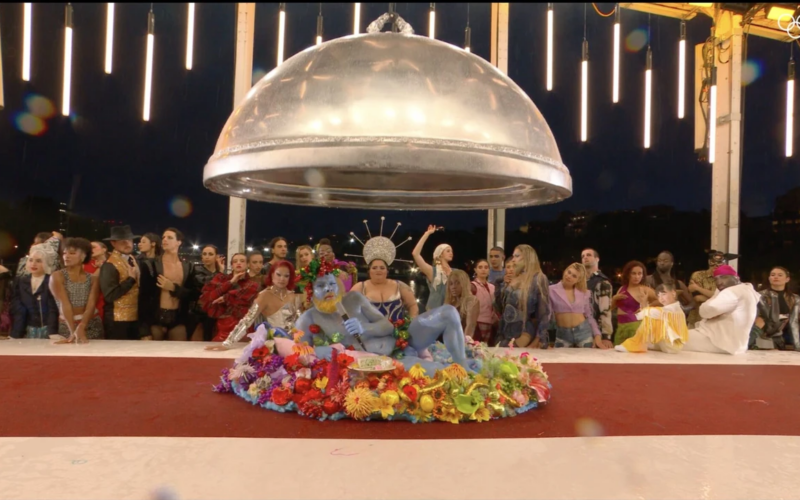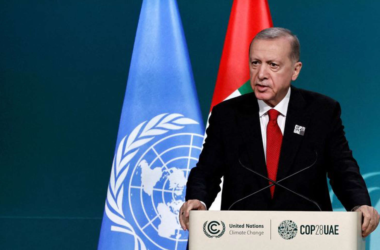Paris has long been celebrated for its audacious spirit, and the 2024 Olympics opening ceremony proved no exception. On Friday night, the French capital delivered an extravagant, boundary-pushing spectacle that left audiences around the world both awed and outraged. While the ceremony championed diversity and freedom, its provocative elements triggered a wave of backlash, especially from religious communities.
The ceremony, masterminded by artistic director Thomas Jolly, embraced themes of inclusivity and LGBTQ+ visibility, reflecting Paris’ pride in its diverse population. However, the show’s unrestrained approach shocked many. Among the most controversial moments was a performance by Philippe Katerine, nearly naked and painted blue, making suggestive references to his body. Drag queen Piche crawled to the beat of “Freed From Desire” by Gala, and intimate embraces between same-sex dancers further underscored the ceremony’s defiant tone.
Jolly, openly gay and vocal about the discrimination he faced growing up, framed the performance as a statement of love and inclusion. “In France, we have the right to love each other, as we want and with who we want. In France, we have the right to believe or to not believe. In France, we have a lot of rights. Voila,” Jolly declared. However, the explicit content was too much for some, including far-right politician Marion Maréchal, who decried the ceremony as a provocation by a left-wing minority.
The most contentious segment involved DJ Barbara Butch, an LGBTQ+ icon, performing on a footbridge in a tableau reminiscent of Leonardo da Vinci’s “Last Supper.” Jolly denied any intention to parody the sacred Christian image, instead describing it as a celebration of diversity and French gastronomy. Despite his explanation, the scene was condemned by many. Maria Zakharova, a spokesperson for Russia’s Foreign Ministry, accused the ceremony of mocking Christianity, while the French Catholic Church’s conference of bishops expressed deep disappointment over what they perceived as derisive and mocking scenes.
The backlash wasn’t limited to France. Archbishop Charles Scicluna from Malta, along with various Catholic leaders across Europe, criticized the ceremony’s perceived irreverence. The Italian bishops’ conference described the event as a parade of banal errors and trite ideologies, while Matteo Salvini, leader of Italy’s far-right League, called the segment squalid and offensive to billions of Christians.
Despite the uproar, many LGBTQ+ athletes and allies celebrated the ceremony. British diver Tom Daley shared a playful photo recreating a scene from “Titanic” with rower Helen Glover, capturing the joyous spirit of inclusivity intended by the organizers.
The ceremony’s boldness extended to a depiction of France’s last queen, Marie Antoinette, clutching her severed head and singing, followed by a heavy metal performance by Gojira. This irreverent approach starkly contrasted with London’s homage to Queen Elizabeth II during the 2012 Olympics, underscoring the French commitment to radical expression.
In response to the controversy, Paris 2024 spokesperson Anne Descamps emphasized that the ceremony aimed to celebrate community tolerance and was not intended to disrespect any religious group.
“We believe this ambition was achieved. If people have taken any offense, we are really sorry,” she stated.
The Middle East Council of Churches condemned the depiction, calling it a sign of ignorance about freedom and human dignity. Egypt’s Al-Azhar, the highest seat of Sunni Muslim learning, also criticized the scenes as disrespectful and offensive to religious sentiments.
In the wake of these reactions, the International Olympic Committee issued a formal apology, reiterating that the ceremony intended to promote tolerance and community. As debates continue over the ceremony’s appropriateness, it remains clear that Paris aimed to make a bold statement about sexual freedom and diversity. Whether this approach succeeded or merely provoked remains a contentious issue, highlighting the deep cultural and ideological divides in contemporary society.








